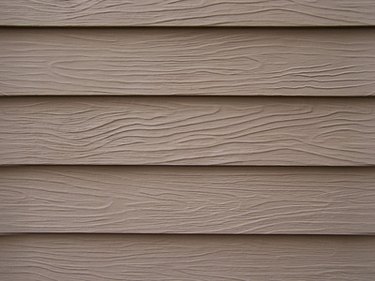Things You'll Need
Pencil
Tin snips
Hammer
Nails
Utility trim
Crimping tool
Aluminum attachments

The entire structure of vinyl siding is based on overlapping sections, with the attachment point on each row of siding covered by the one above it. For most of the house, this method works wonderfully, except for the top row. Without an additional layer of siding to cover it as it touches the soffit, installers must take extra steps to give the siding job a finished look. Even more importantly, the top row of siding needs to be finished properly to prevent water from getting behind the vinyl and damaging the house.
Step 1
Install siding as normal until you reach the second row from the top.
Video of the Day
Step 2
Using a piece of scrap siding as a template, measure the width of the second to last row, marking it with your pencil. Use this template as a guide to cut the width of the next-to-last piece of siding you plan to install.
Step 3
Cut the second-to-top row's piece lengthwise to fit the space. Install that row of siding.
Step 4
Using a hammer and nails, attach utility trim along the bottom edge of the soffit. Make sure this trim is as close to the soffit as possible, as the final row of siding attaches to this.
Step 5
Attach the aluminum attachments to the uppermost edge of the top piece of siding using the crimping tool. Affix attachments every 6-8 inches to allow the siding to be flexible enough to expand and contract with heating changes.
Step 6
Slide the aluminum attachments into the holes in the utility trim below the soffit. They'll click into place when pushed far enough.
Tip
As always when installing vinyl siding, make sure to attach the top piece so that it can weather temperature changes: If it's too tight it may bow in the heat or crack in the cold.
Video of the Day